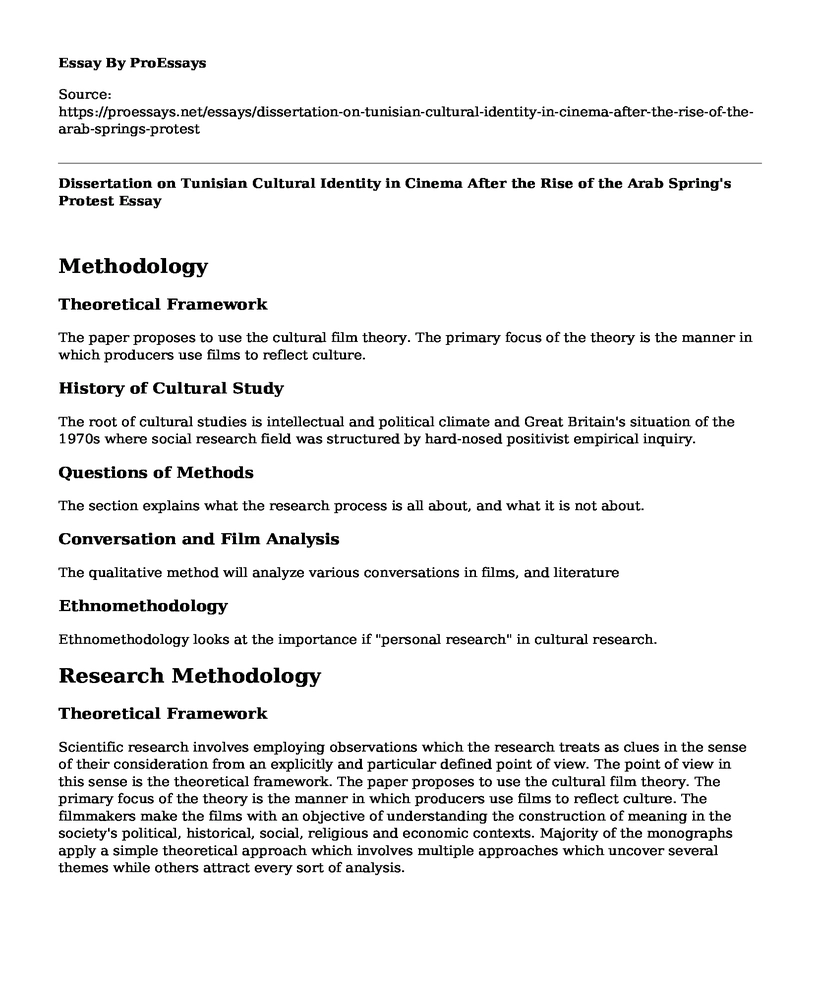Methodology
Theoretical Framework
The paper proposes to use the cultural film theory. The primary focus of the theory is the manner in which producers use films to reflect culture.
History of Cultural Study
The root of cultural studies is intellectual and political climate and Great Britain's situation of the 1970s where social research field was structured by hard-nosed positivist empirical inquiry.
Questions of Methods
The section explains what the research process is all about, and what it is not about.
Conversation and Film Analysis
The qualitative method will analyze various conversations in films, and literature
Ethnomethodology
Ethnomethodology looks at the importance if "personal research" in cultural research.
Research Methodology
Theoretical Framework
Scientific research involves employing observations which the research treats as clues in the sense of their consideration from an explicitly and particular defined point of view. The point of view in this sense is the theoretical framework. The paper proposes to use the cultural film theory. The primary focus of the theory is the manner in which producers use films to reflect culture. The filmmakers make the films with an objective of understanding the construction of meaning in the society's political, historical, social, religious and economic contexts. Majority of the monographs apply a simple theoretical approach which involves multiple approaches which uncover several themes while others attract every sort of analysis.
History of Cultural Study
The root of cultural studies is intellectual and political climate and Great Britain's situation of the 1970s where social research field was structured by hard-nosed positivist empirical inquiry. These were marked by hard-nosed positivist political economy. Cultural studies curved its space between two positions: administrative research which involved conducting research on small groups and using opinions and criticisms of popular culture as a way of proving that the media and post-war consumer culture had killed dissent and social criticisms which the nearly fascist mass society created.
Questions of Methods
The section explains what the research process is all about, and what it is not about. The section also links the concept of methods of cultural studies and research about the issue of cultural identity in Tunisia. There are two primary methods of inquiry-qualitative and quantitative methods. Therefore, the research explores how to research culture through an interdisciplinary approach. Concerning this, the research adopts a qualitative research method.
Qualitative research method enables the researcher to differentiate between the research results and the observations. The major component of the method involves the operations and practices where the research employs the use of observations and the guidelines of modifying and interpreting the observations with an objective of assessing meanings and clues.
The qualitative method, therefore, discusses the possible ways in which the research will employ in gathering materials and the criteria used in classifying the cases. The qualitative research method which the study will employ will, therefore, be in harmony with the theoretical framework of the study.
Conversation and Film Analysis
The qualitative method which the research will adopt will involve analyzing various conversations in films, and literature. The primary concern will be the formal features of conversations where the research will want to know about representations of Tunisian cultural identity in the film industry after 2011. Conversation analysis focuses on the contents and not the formal features of the research. The method employs these as additional information where the research analyzes about the fact that the method can provide clues and issue exciting perceptions.
The Research Self and Research Process
The study will define the actual process of research about the topic of discussion which in this case is the representation of Tunisian cultural identity in cinema after 2011. The research process involves position, self, reflexivity, and others.
Ethnomethodology
Ethnomethodology looks at the importance if "personal research" in cultural research. The method involves analyzing Tunisian films about auto/biography, autoethnography, ethnography, and feminist ethnography. The research will also look at the observation methods at this point. These will mainly involve interviews, conversations, memory and focus groups. The interviews will both be structured and unstructured. The research will also analyze various cinema contents and employ textual approaches.
Bibliography
Alasuutari, Pertti. Researching culture: Qualitative method and cultural studies. Sage, 1995.
Elsaesser, Thomas, and Malte Hagener. Film theory: An introduction through the senses. Routledge, 2015.
Fontana, Andrea, and James H. Frey. "The interview: From structured questions to negotiated text." Handbook of qualitative research 2, no. 6 (2000): 645-672.
Lafrance, Melanie A. "The process of minoritisation of the Franco-Ontarian identity and its numerous articulations: a Montfort Hospital case study." (2008).
Cite this page
Dissertation on Tunisian Cultural Identity in Cinema After the Rise of the Arab Spring's Protest. (2022, Mar 27). Retrieved from https://proessays.net/essays/dissertation-on-tunisian-cultural-identity-in-cinema-after-the-rise-of-the-arab-springs-protest
If you are the original author of this essay and no longer wish to have it published on the ProEssays website, please click below to request its removal:
- Essay Sample on Attitudes Towards Christmas Festivities
- Global Outsourcing, Social Media, and the Redefinition of Labor Essay
- Essay Sample on Role of Museums in History
- Essay Sample on Plagiarism
- Essay Example on War Room: A Director's Journey of Crafting a Masterpiece
- Rachel Carson: From Nature Explorer to Renowned Environmental Author - Essay Sample
- Essay Example on Medicine Wheel: Symbol of Indigenous Identity & Dignity







